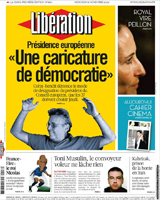Male or female? Right-wing or left-wing? High profile player or back office manager? On the eve of the informal summit of European Union leaders in Brussels, there is no end of speculation on the identity of the future.
President of the European Council and High Representative for Foreign Affairs and Security. On Thursday, heads of state and government leaders will sit down "to an official dinner and a comprehensive menu of dignitaries in line for the two most powerful jobs in the EU," reports Jurnalul National, which further avers that "hot lines between European capitals must have been busy with endless bargaining to establish an appropriate compromise" on the two posts.
However in Madrid, El País notes that "the process of electing an EU President has been so chaotic that many observers in Brussels doubt that the summit will produce results." If that is the case, De Standard is convinced that "Sweden, the current holder of the EU presidency," ought to be held to blame. The Belgian daily further insists that the Swedes "neglected to take advantage of a historic opportunity, where they could have put in place the first piece of the puzzle" when European leaders met in Berlin on 9 November. Then on 16 November, Sweden's Minister for Foreign affairs, Carl Bildt, refused to touch on the burning issue when he simply stated that the summit was still three days away, which amounted to "an eternity in politics." On this basis, De Standardtakes the view that the selection procedure will be as unpredictable as "a game of pinball."
EU must stop working like Soviet Union
For an East European diplomat quoted in the Daily Telegraph, "Trying to work out who is going to be President of the EU Council is not dissimilar to decoding who was in or out in the Kremlin in the 1970s. It seems strange to many of us that 20 years after the fall of the Berlin Wall we have to dust off our Kremlinology skills here in Brussels" — a situation that the Estonian daily Postimees attributes to political apathy in the EU. As it stands, the favourite for the post of EU President, Belgian Prime MinisterHerman Van Rompuy has not announced that he is in the running. Only three candidates have officially come forward: the Prime Minister of Luxembourg, Jean-Claude Juncker, and representatives of two Baltic states, Latvia's Vaira Vike-Freiberga and Estonian President Toomas Hendrik Ilves. A Polish suggestion that candidates should present policy proposals and officially announce their intention to seek election to the two posts received support from Vaira Vike-Freiberga, who has called on the EU to "stop working like the former Soviet Union," but was dismissed by the current EU presidency, which deemed it to be impractical.
It is no coincidence that EU procedures are being questioned "by three new member states who have yet to understand which method to adopt," notes Volkskrant. "In the diplomatic arena, this forthright approach is greeted with patronizing smiles," adds the Dutch daily, which concludes that new member states "which have not been steeped in time honoured Brussels traditions make the mistake of believing that the EU is in fact a union."
Beware of gorillas in the mist
For
However, for Die Presse, the secrecy is mainly motivated by the fact that "no one wants to lose face." The Vienna daily, which compares Europe's politicians to a band of "gorillas in the mist" argues that "nothing could be more 
Do you like our work?
Help multilingual European journalism to thrive, without ads or paywalls. Your one-off or regular support will keep our newsroom independent. Thank you!
















